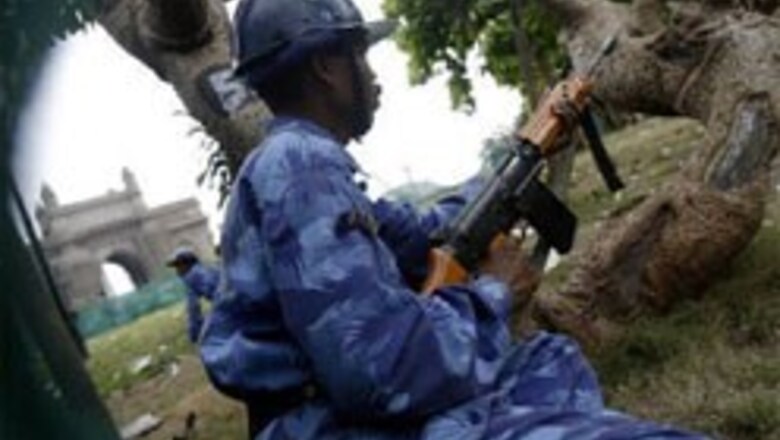
views
Islamabad: When Pakistan's spy chief goes to India to share information over a militant attack on Mumbai, one of his tasks will inevitably be to convince the Indian leadership that his own agency was not involved.
Pakistan's eight-month-old civilian government has already made clear how appalled it is at the havoc wreaked by Islamist militants in a raid in which at least 124 people were killed.
Prime Minister Yousaf Raza Gilani has ordered the Inter-Services Intelligence (ISI) chief, Lieutenant-General Ahmed Shujaa Pasha, to go to India after a request from Indian Prime Minister Manmohan Singh.
"I'm sure the military believes it is important for the ISI to try to disassociate itself from any link to militants responsible for this attack," said Ayesha Siddiqa, an Islamabad defence analyst.
Nuclear-armed Pakistan has the most anti-Indian, anti-Western and best-organised militant groups in South Asia, some of which have fallen under the thrall of al Qaeda leaders hiding there.
Lashkar-e-Toiba (LeT), a militant group based in Pakistan's central province of Punjab, is prime suspect in the attacks on Mumbai, according to Indian media reports.
LeT along with the Jaish-e-Mohammad group pioneered "fedayeen attacks", or suicidal missions, against Indian forces in the late 1990s, infusing jihadi fervour into a separatist revolt in Indian Kashmir.
Like al Qaeda, LeT's pedigree is Wahabi, the Muslim sect that sprang out of the Arabian Peninsula.
Well organised, and well funded it was said to have been one of the groups most favoured by ISI handlers in the past, according to security analysts. Critics say Pakistani agencies' failure to treat all militants as enemies has risked destabilising the state.
Pakistan has become a victim of militancy with almost daily attacks on security forces in the northwest and bomb blasts in cities, including one that destroyed Islamabad's Marriott hotel in September.
NOT EVEN UNDERGROUND
India has long accused Pakistan of nurturing jihadi groups to fight in the disputed Kashmir region, while Afghanistan believes the Pakistani military has allowed the Taliban sanctuaries.
Pakistan says it only provides diplomatic and moral support for the Kashmir freedom struggle. LeT and Jaish were accused of carrying out the attack on the Indian Parliament in December 2001, which brought the two nuclear-armed rivals to the brink of war in mid-2002.
Both groups were banned by Pakistan, but critics say it was just window-dressing, and these groups still operate under different guises and their headquarters resemble militia camps.
"These networks haven't been dismantled, though they've been banned several times over. That's what the Musharraf government did, (but) it didn't even drive them underground," Siddiqa said. Indian Foreign Minister Pranab Mukherjee urged Pakistan on Friday to dismantle the infrastructure that aids militants.
PAGE_BREAK
The civilian government, that ended more than eight years of rule by army chief Pervez Musharraf, wants better ties with India, but New Delhi's mistrust of Pakistan's military remains.
India and Afghanistan, backed by the United States, said a suicide attack outside the Indian embassy in Kabul in July was carried out by a Pakistani group working with ISI agents.
"The difficulty in all this is we do have reports continuously of rogue elements within the intelligence agencies, and disaffected ranks within the Pakistan military about how the government has chosen to conduct its relations with India," said Farzana Shaikh, an associate fellow at Chatham House in London.
"Ultimately it is the Pakistan military who calls the shots on relations with India," said the author of a forthcoming book "Making Sense of Pakistan".
THE AMERICAN DIMENSION
How to deal with the different centres of power in Pakistan poses a difficult problem for India, as it won't want to destabilise a potentially friendly government. President Asif Ali Zardari has shown dovishness towards India since taking over from Musharraf in September.
Last weekend he suggested a "no first use" accord on nuclear weapons, while his soft-pedalling on Kashmir has angered militant leaders.
"It's a fragile democratic transition, how do they manage the military, as it is Zardari's sensible comments on no first use have riled so many quarters in Islamabad," Siddiqa said.
Pakistanis are already upset by their government's failure to take sterner action to stop U.S. missile strikes in the tribal regions, and will expect it to defend national honour more vigorously against India.
"There's an increasingly angry mood in Pakistan, a mood that rests on the fact that its sovereignty is being breached daily" by such things as the US drone strikes," said Shaikh.
The Pakistani military also fears India's friendship with Afghanistan resulting in its encirclement.
The tension will trouble the incoming US administration of President-elect Barack Obama, which doesn't want friction between India and Pakistan hampering efforts to stabilise Afghanistan. Shaikh expected US diplomacy to go into overdrive to calm relations in South Asia.
"There's going to be a great deal of pressure being applied from that direction to keep things stable," she said.



















Comments
0 comment